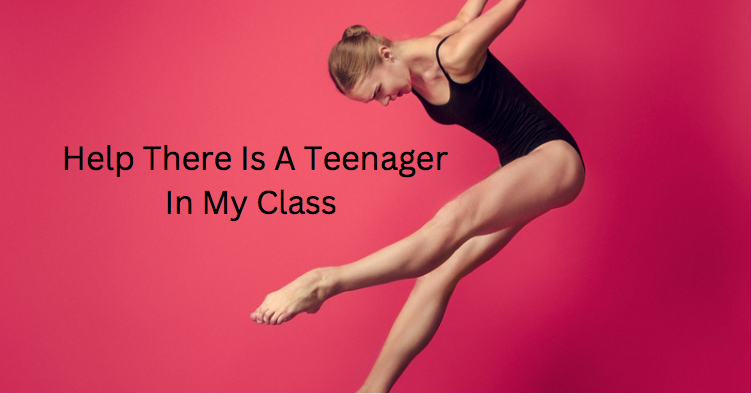 How to deal with a teenager in your dance studio is a problem we as dance teachers will all face at some time or another. For the most part, things will run smoothly, but there are always problem teenagers, whether they get suddenly stubborn and won’t take correction, are always tired, or just get downright cheeky.
How to deal with a teenager in your dance studio is a problem we as dance teachers will all face at some time or another. For the most part, things will run smoothly, but there are always problem teenagers, whether they get suddenly stubborn and won’t take correction, are always tired, or just get downright cheeky.
Strangely, in the last few years, the problems with teenagers seem to be getting worse and worse, and I hear a lot of my colleagues complaining about how disrespectful teenagers have become of late.
As a group, teenagers strive for individuality yet crave peer acceptance. They act like they know everything and yet lack the needed experience. They feel invincible and yet are often insecure with themselves. Some teenagers thrive on testing and challenging authority and a few may even be self-destructive.
I am sure this scenario looks familiar to a lot of us.
Suddenly a pupil that we have been teaching all our lives doesn’t want to conform.
She rebels by not wearing her uniform dance clothing to class, as she could be self-conscious about her developing body.
She rolls her eyes behind your back when you try to correct her.
She back-chats you or is cheekier than normal.
She is always tired or has something that is sore.
She seems like a totally opposite person to who she used to be.
Believe it or not, this is quite common behavior for pupils between the ages of 11 and 16. After that, they become normal people again thank goodness.
It can be quite daunting for the young teacher who is starting out, and because she is probably close to the age of some of the teens she will be teaching, she may find it a bit tough to handle them as a teacher would and not as a friend would.
How to Deal With a Teenager In Dance Class
Well dance teachers, know you are not alone. We all have problems with cheeky and disrespectful teenagers.
First of all, it is important to realize that teenagers do not have the same control of their impulses and emotions that we do, since the part of the brain that helps one think ahead and adjust behavior (the pre-frontal cortex), is still developing.
However, he or she still needs to learn how to control impulsive and rude behavior, not only to make life more pleasant for those surrounding them at the time, but also because the experiences that one has during adolescence help to wire the brain to effectively deal with emotions and impulses throughout life.
We as adults need to set clear boundaries and rules about what kind of behavior will be tolerated, and what consequences exist for engaging in behavior that is not allowed.
 If a teenager talks back to you or refuses to do something you have asked, take a few seconds to remind yourself to stay calm, and think about what you are about to say. You may need to take a deep breath and count to ten.
If a teenager talks back to you or refuses to do something you have asked, take a few seconds to remind yourself to stay calm, and think about what you are about to say. You may need to take a deep breath and count to ten.
Do not yell at the child, as this will cause more tension. Rather walk away and chat with her later when she is on her own and you have both calmed down.
If a group of teenagers in the class is generally giving you a hard time, it is a good idea to focus on the leader of the pack. Maybe separate him or her in some way from the rest of the pack as they do tend to feed off of one another. Try diverting their attention by dividing them into groups for an assignment or dance challenge.
Back chatting is normally a teenager trying to assert their independence and test the limits, so help them make good choices within the boundaries you have set.
Never be sarcastic or rude. Be very aware of how you treat others, as your pupils also follow your behavior. Sometimes you will even need to apologize for your own behavior, as we are not all perfect, and this can also make a difference in the attitude of the teenager.
If the teenager seems to be out of control or defying you in ways that endanger her safety or that of others, seek outside or professional assistance immediately.
Many difficult teenagers behave as they do because they don’t believe adults really listen to them. When you see a teenager upset, offer the young person the option of talking with you. Say, for example, “I’m here to listen if you want to talk, okay?” Make yourself available and remind the teenager of this from time to time, but don’t insist on it. Use the “pull” strategy and let the young person come to you if and when they are ready.
Ultimately, it starts at home. Parents need to educate themselves on how to deal with a teenager and should be active in helping their children break those bad habits. This will help her to relate to others and be successful in life.
Here are some tips on how to deal with a teenager that you can try in your dance studio:
- As a teacher, you need to make sure that respect is a part of your studio culture. If you do have a problem with a pupil you need to address the issue before it gets out of hand.
- If you have an issue with one of your pupils, set up a parent-teacher conference, and preferably have another staff member with you at the meeting. Have somebody take notes and try and determine together what solution can be reached and whether or not the student is willing to participate on your terms or leave the studio.
- You need to hold your pupils accountable for their behavior, and you need to let your students know what sort of behavior is not tolerated in your studio, for example bullying, cheek, etc. If you address the issues right away, you can prevent the issue from having a negative impact on the rest of your studio.
- A good idea is to state what sort of consequences will be dealt out for certain behavior in writing when a student joins your dance studio. Also state what type of behavior would result in dismissal from your classes and be prepared to follow through and set an example.
- Try not to let your fear of losing your students stop you from doing what is best for your business. It is best to work through any problems with your students, so that they know where they stand, and you in turn can create a more peaceful environment.
- If a student decides to leave or is dismissed by you, be prepared, as they often post negative remarks or comments on social media. You should have a professional statement from the studio regarding any of the actions that you have taken.
Hope this post has helped at least one teacher figure out ways on how to deal with a teenager. Please add your thoughts and comments below.

